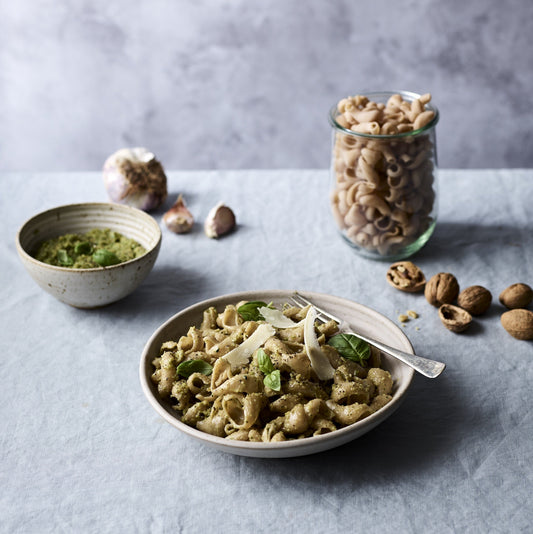Mast Year Magic: A Bumper Crop for British Organic Walnuts
If you’ve been out walking this autumn, you might have noticed the hedgerows and woodland floors brimming with acorns, hazelnuts and conkers. Nature is having what’s known as a “mast year” – a natural phenomenon where trees produce an unusually large crop of nuts and seeds. It doesn’t happen every year, but when it does, it’s spectacular.
At Sharpham Park, our walnut orchard has followed the same rhythm. After twenty years in the making, this season has brought a truly bumper crop of British organic walnuts – the best we’ve ever seen.
What Is a Mast Year?
A “mast year” occurs when nut and seed trees, such as oaks, beeches and walnuts, synchronise their energy to produce an abundance all at once. Scientists believe it’s nature’s clever way of ensuring survival: by flooding the landscape with food, some seeds are guaranteed to escape hungry wildlife and grow into new trees.
For farmers like us, a mast year feels like a reward for years of care and patience. Our walnut trees have matured beautifully, and the combination of a mild spring and warm summer has resulted in heavier yields and exceptional quality nuts.

Twenty Years in the Making
Our journey began two decades ago when we planted the UK’s first organic walnut orchard here in Somerset. We believed that British-grown walnuts could thrive on our soil, and that they’d one day rival the quality of imports from France and California.
This year’s harvest is proof that patience pays off. The trees are now in full stride, producing a rich, buttery nut that’s fresh, sweet and packed with goodness. Every walnut we sell is grown, harvested and packed right here at Sharpham Park – a genuine farm-to-table product with a traceable story.
Good for the Heart, Brain and Gut
Walnuts are a nutritional powerhouse. They’re the only nut rich in Omega-3, the same healthy fat you find in oily fish, known to support heart and brain health.
A small handful a day can help lower cholesterol, boost focus and mood, and the natural fibre helps keep your gut microbiome happy. They’re also loaded with antioxidants and plant protein, making them one of the most complete foods you can grow.
A Future Food for a Changing Climate
Walnuts aren’t just good for us – they’re good for the planet too.
They’re carbon-absorbing, pollinator-friendly and drought-resilient, which is why the WWF and Knorr “Future 50 Foods” report lists them among the most sustainable crops on earth.
At Sharpham Park we farm organically and regeneratively, focusing on soil health, biodiversity and a circular approach – from using the nut husks for natural dyes to turning prunings into wood chips for compost.

Working with Nature, Not Against It
Everything we do on the farm follows nature’s cycles. Our orchards are alive with cover crops, wildflowers and pollinators, each playing their part in the ecosystem.
We build fertility naturally, using composts, mulches and the fallen leaves of the trees themselves. We capture carbon through deep-rooted plants, and encourage wildlife – from bees and butterflies to barn owls and bats.
It’s a constant conversation with the land – not about forcing production, but harnessing what Mother Nature already knows how to do best. The result is a landscape that thrives year after year, producing food that’s as good for the planet as it is for the body.

From Orchard to Table
Our 2025 harvest is now available to pre-order in limited quantities. Whether you crack them fresh for snacking, fold them through cakes, or sprinkle them over salads, these walnuts capture the flavour of the English countryside at its best.
This mast year reminds us that when we work with nature, not against it, the rewards are worth the wait.
“Twenty years ago, we planted an idea. Today, we’re harvesting proof that British organic walnuts belong on the world stage.”
— Roger Saul, Founder of Sharpham Park




